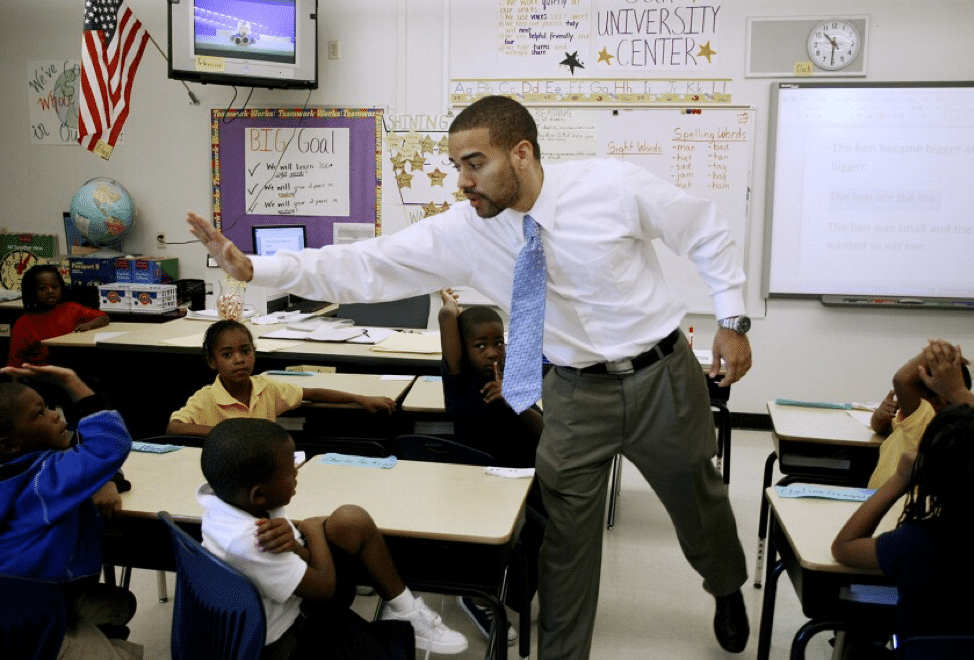10 Jun2022
By Madeline Will

Michael Darmas, a Teach For America instructor, gives his student a high five in this 2011 photo taken at Holmes Elementary School in Miami.
J Pat Carter/AP
This article originally appeared in Ed Week.
Alternative-certification programs have long been thought of as one solution to teacher shortages, but a new analysis shows that the number of candidates completing those programs has declined over the past decade, despite a boom in enrollments and new offerings.
The findings underscore the complex and changing nature of the teacher hiring pipeline: Alternative programs are typically cheaper and faster than traditional teacher-preparation programs based at colleges and universities. They are bringing in new and more diverse talent to the teaching workforce. But as the authors of the new report warn, their candidates don’t always finish, and quality control remains an issue.
29 Apr2022
By U.S. Department of Education
During Second Chance Month, the U.S. Department of Education announced actions to help incarcerated individuals access educational programs as part of the Biden-Harris Administration’s broader efforts to support reentry, empower formerly incarcerated persons, enhance public safety, and strengthen our communities and our economy. The Department has invited 73 colleges and universities to participate in the third round of the Second Chance Pell Experiment, an initiative first launched by the Obama-Biden Administration to expand access to Federal Pell Grants for incarcerated individuals enrolled in participating programs. The expansion will bring the total number of schools able to participate in the Second Chance Pell Experiment to 200. The Department is also announcing changes to policies to help incarcerated individuals with defaulted loans, including affirming that incarcerated individuals qualify for a “fresh start,” which returns borrowers with defaulted loans to repayment in good standing and allows them to access programs like the Second Chance Pell Experiment. The Department will also allow incarcerated individuals to consolidate their loans to help them exit default in the long term.
18 Mar2022
By Kaitlyn Brennan

This weekly Washington Update is intended to keep members informed on Capitol Hill activities impacting the educator preparation community. The views expressed in this post do not necessarily reflect the views of AACTE.
We are now hearing that the President’s budget request for fiscal year (FY) 2023 will likely be sent to Congress the last week of March or first week of April. The release of the budget signals the official “kick-off” for the FY 2023 appropriations cycle. Advocates will continue to work diligently to secure meaningful investments to support rebuilding and diversifying the special educator and specialized instructional support personnel.
Top Democratic Leaders Urge Biden Administration to Extend Student Loan Repayment Pause
Top Democratic leaders, including Senator Patty Murray (D-WA) who chairs the Senate education committee, are urging the Biden Administration to extend the moratorium on federal student loan repayments until at least the start of 2023. In a statement, Senator Murray noted the importance of fixing the “broken student loan system” and that borrowers are “struggling with rising costs, struggling to get their feet back under them after public health and economic crises, and struggling with a broken student loan system — and all this is felt especially hard by borrowers of color.”
05 Mar2022
By AACTE
AACTE was one of 94 higher education associations and organizations to issue the following joint statement:
Colleges and universities exist to examine complex issues, challenges, and ideas, and to provide a forum in which issues and opinions can be explored and openly debated. In our intensely politicized and divided country, with social media and societal silos coarsening already heated conversations, this can be extraordinarily challenging. Yet, fostering a rigorous and civil exchange of ideas has never been more important. To best serve American society, higher education institutions are committed to transparent intellectual inquiry and academic excellence, free speech, and civil discourse. It is incumbent on our governmental institutions to share and support this commitment.
Efforts to suppress inquiry, curb discussion, and limit what can be studied violate the basic principles of free speech and an open exchange of ideas, and undermine the very purpose of higher education. Nonetheless, some elected officials have proposed measures foreclosing evaluation of complex and challenging ideas.
10 Dec2021
By AACTE
On behalf of the American Association of Colleges for Teacher Education (AACTE), President and CEO Lynn M. Gangone issued the following statement in support of the Educators for America Act, which would update and modernize Title II of the Higher Education Act:
“AACTE enthusiastically supports the Educators for America Act and thanks Sen. Reed and Rep. Adams for their unwavering leadership in support of educator preparation. This comprehensive bill will make robust investments in teacher and other educator preparation programs while alleviating our nation’s educator shortage, diversifying the profession, and providing critical support to our member institutions and their community partners.”
06 Dec2021
By Jacqueline Rodriguez
 The Center for Innovation, Design, and Digital Learning (CIDDL) is inviting you to join a community of higher education faculty members focused on sharing tips and tricks, research-based practices, and strategies for innovative use of educational technology in educator or leadership preparation programs. CIDDL’s mission is to influence change that supports the appropriate use of educational technology in all early intervention/early childhood special education (EI/ECSE), related services, and K-12 learning environments to improve outcomes for all students, especially those with disabilities.
The Center for Innovation, Design, and Digital Learning (CIDDL) is inviting you to join a community of higher education faculty members focused on sharing tips and tricks, research-based practices, and strategies for innovative use of educational technology in educator or leadership preparation programs. CIDDL’s mission is to influence change that supports the appropriate use of educational technology in all early intervention/early childhood special education (EI/ECSE), related services, and K-12 learning environments to improve outcomes for all students, especially those with disabilities.
28 Oct2021
By Michael Rose

AACTE expressed its strong support and appreciation for the historic funding for educator preparation programs included in President Joseph Biden’s Build Back Better framework, which was released today. This funding will help ensure that our nation’s classrooms are led by profession-ready and diverse educators. AACTE strongly urges Congress to pass this legislation as quickly as possible to help address the shortage of educators our nation has been experiencing and that has gotten worse in recent years.
27 Oct2021
By Ward Cummings
 AACTE continues to work with its national coalition partners toward enhancing and improving the state of education and the educator preparator profession in the United States. To that end, the Association added its voice this month to the chorus of supporters of the Biden Administration’s Build Back Better education agenda.
AACTE continues to work with its national coalition partners toward enhancing and improving the state of education and the educator preparator profession in the United States. To that end, the Association added its voice this month to the chorus of supporters of the Biden Administration’s Build Back Better education agenda.
In a letter to congressional leaders who are currently engaged in negotiating the elements of the president’s budget package, AACTE expressed its specific support for a key higher education component of the Building Back Better agenda: America’s College Promise. Contained within America’s College Promise is a historic, first-of-its-kind tuition-free community college program; an increase to the Pell Grant; and a retention and completion grant program.
28 Sep2021
By Matthew J. Camp
This article originally appeared in Inside Higher Education and is reprinted with permission from the op-ed author. The views expressed in this post do not necessarily reflect the views of AACTE.
September 2 marked the anniversary of the National Defense Education Act, the law signed by President Dwight D. Eisenhower in 1958 to vastly expand funding for colleges and universities. The country has been the better for it ever since. Eisenhower famously warned about the military-industrial complex and how every dollar spent on a bomber could have been spent on a school.
Today, Americans realize the futility of spending $2 trillion over 20 years fighting a lost war in Afghanistan. What would the world look like if that money had been spent on education in that country and in ours? Now is the time for every college in the country to fight hard for the next massive investment in higher education. Quite simply, they should lobby for our future.
Unfortunately, higher education institutions have historically played defense when it comes to advocating for their own interests. For the past four years, colleges have spent lots of time and money responding to chaotic Trump-era proposals on immigration, free speech on campus, graduate student taxes, Title IX changes and restrictions on research. In most states, funding to higher education is much lower today than it was 20 years ago.
06 Jul2021
By Jane E. West and Kaitlyn Brennan

House Appropriations Committee Set to Move on Education Spending Bill
While many Members of the Senate traveled home this week for a scheduled state work period, Members of the House of Representatives kept things moving on Capitol Hill setting funding levels for the FY2022 appropriations bills.
The House Appropriations Committee voted on allocations for each of the FY2022 appropriations measures which are moving through the House with hopes of meeting the September 30 deadline. Referred to as 302(b) allocations—these numbers reflect how much money is available for each of the 12 appropriations bills. Essentially, this is the House Democrats’ opening offer for proposed funding levels for FY2022. The Senate has not yet taken a position on 302(b) allocations for their versions of the bills and that could delay movement down the road.
30 Jun2021
By Michael Rose
Earlier this year, AACTE reconstituted the Higher Education Task Force. The task force, which was previously led by AACTE, will share information about the policy work underway in the teacher preparation world with our higher education colleagues and inform Congress and other key officials about important developments related to the field. Unfortunately, due to the pandemic, the change of administrations and other factors, the task force was dormant for a short time. But AACTE’s colleagues eagerly accepted our invitation to rejoin.
Task force participants are from the major associations of higher education, whose members are presidents of institutions of higher education. Members include the American Council on Education (ACE), American Association of State Colleges and Universities (AASCU), Association of American Universities (AAU), Association of Public and Land-Grant Universities (APLU), American Association of Community Colleges (AACC), American Indian Higher Education Consortium (AIHEC), Council for Christian Colleges & Universities (CCCU), Hispanic Association of Colleges and Universities (HACU), National Association for Equal Opportunity in Higher Education (NAFEO), National Association of Independent Colleges and Universities (NAICU) and UNCF.
03 Jun2021
By Meghan Grenda
 Are you interested in connecting with colleagues that share your interests and have similar areas of expertise? If so, AACTE encourages you to join one of its Topical Action Groups (TAGs).
Are you interested in connecting with colleagues that share your interests and have similar areas of expertise? If so, AACTE encourages you to join one of its Topical Action Groups (TAGs).
TAGs are AACTE action-oriented working groups that focus on areas such as accreditation, Historically Black Colleges and Universities (HBCUs), elementary education, research in teacher preparation, international education, and women in leadership—just to name a few. In addition to collaborating with your peers, AACTE provides TAGs with operational funds, marketing and staff support, and complimentary meeting space at the AACTE Annual Meeting.
01 Jun2021
By Jane E. West and Kaitlyn Brennan
 This blog post is written by AACTE consultant Jane West and is intended to provide updated information. The views expressed in this post do not necessarily reflect the views of AACTE.
This blog post is written by AACTE consultant Jane West and is intended to provide updated information. The views expressed in this post do not necessarily reflect the views of AACTE.
Biden- Harris Administration Unveils Massive Budget with Historic Investments in Education
On the Friday before the long-awaited Memorial Day holiday, just as Members of Congress were headed home and the rest of us were finalizing our plans for the long weekend, the White House unveiled the complete version of the Biden-Harris Administration’s full budget proposal for FY 2022.
The budget proposal calls for $102.8 billion for the Department of Education—a $29.8 billion or 41% increase to the Department’s current spending levels. This increase in funding would be the largest increase the Department has seen since its inception in 1979.
17 May2021
By Makenzie Kenny
This article originally appeared on KOMU 8 and is reprinted with permission.
Education programs across the country were presented with unforeseen challenges during the pandemic, in a career field that is already difficult to recruit for.
Despite these challenges, the University of Missouri’s program has not seen any impact on their enrollment numbers from the pandemic.
A survey conducted by the American Association of Colleges for Teacher Education found that 19% of undergraduate-level and 11% of graduate-level teaching programs saw a significant drop in enrollment this year, according to the New York Times.
Associate Dean for Student Success and Academic Affairs and Professor John Lannin said this is because of intentional outreach to prospective students.
12 May2021
By Ward Cummings
 The Ohio Deans Compact on Exceptional Children has a mission to act collectively in support of improved learning and results for all children, but especially those from marginalized groups. Compact serves as a forum for shared learning and collective action. Due to its efforts, critical connections have been made within and outside the state through representation from key stakeholder groups, including the members of Ohio Association of Colleges for Teacher Education and AACTE.
The Ohio Deans Compact on Exceptional Children has a mission to act collectively in support of improved learning and results for all children, but especially those from marginalized groups. Compact serves as a forum for shared learning and collective action. Due to its efforts, critical connections have been made within and outside the state through representation from key stakeholder groups, including the members of Ohio Association of Colleges for Teacher Education and AACTE.
The 30-member organization meets quarterly and is comprised of leaders from the Ohio Department of Education and the Ohio Department of Higher Education (ODHE). Compact members participate on one of four standing committees (Dissemination, Impact Evaluation, Low Incidence, Policy). Institutions that are awarded incentive grants through the Compact participate in a facilitated community of practice (CoP), which serves as a peer-to-peer network for representatives from public and private institutions.









 The Center for Innovation, Design, and Digital Learning (CIDDL) is inviting you to join a community of higher education faculty members focused on sharing tips and tricks, research-based practices, and strategies for innovative use of educational technology in educator or leadership preparation programs. CIDDL’s mission is to influence change that supports the appropriate use of educational technology in all early intervention/early childhood special education (EI/ECSE), related services, and K-12 learning environments to improve outcomes for all students, especially those with disabilities.
The Center for Innovation, Design, and Digital Learning (CIDDL) is inviting you to join a community of higher education faculty members focused on sharing tips and tricks, research-based practices, and strategies for innovative use of educational technology in educator or leadership preparation programs. CIDDL’s mission is to influence change that supports the appropriate use of educational technology in all early intervention/early childhood special education (EI/ECSE), related services, and K-12 learning environments to improve outcomes for all students, especially those with disabilities.
 AACTE continues to work with its national coalition partners toward enhancing and improving the state of education and the educator preparator profession in the United States. To that end, the Association added its voice this month to the chorus of supporters of the Biden Administration’s Build Back Better education agenda.
AACTE continues to work with its national coalition partners toward enhancing and improving the state of education and the educator preparator profession in the United States. To that end, the Association added its voice this month to the chorus of supporters of the Biden Administration’s Build Back Better education agenda.
 Are you interested in connecting with colleagues that share your interests and have similar areas of expertise? If so, AACTE encourages you to join one of its
Are you interested in connecting with colleagues that share your interests and have similar areas of expertise? If so, AACTE encourages you to join one of its  This blog post is written by AACTE consultant Jane West and is intended to provide updated information. The views expressed in this post do not necessarily reflect the views of AACTE.
This blog post is written by AACTE consultant Jane West and is intended to provide updated information. The views expressed in this post do not necessarily reflect the views of AACTE.  The Ohio Deans Compact on Exceptional Children has a mission to act collectively in support of improved learning and results for all children, but especially those from marginalized groups. Compact serves as a forum for shared learning and collective action. Due to its efforts, critical connections have been made within and outside the state through representation from key stakeholder groups, including the members of Ohio Association of Colleges for Teacher Education and AACTE.
The Ohio Deans Compact on Exceptional Children has a mission to act collectively in support of improved learning and results for all children, but especially those from marginalized groups. Compact serves as a forum for shared learning and collective action. Due to its efforts, critical connections have been made within and outside the state through representation from key stakeholder groups, including the members of Ohio Association of Colleges for Teacher Education and AACTE.